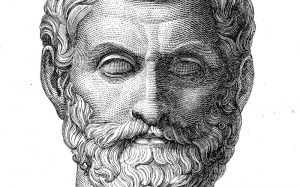Xenophanes
Colophon's Xenophanes was a poet and wise traveler who had strong philosophical inclinations and who lived in ancient Greece during the 6th century and the beginning of the 5th century BC. There are a significant number of fragments that have managed to survive despite the years, and the poetic verses are available to us indicating a wide range of issues. These include commentaries on religion, knowledge, the natural world, proper behavior at a banquet, as well as other social teachings and commentaries.

- Born: 570 B.C.
- Birthplace: Colophon, Asia Minor
- When he died: 478 B.C.
- Where did he die: Elea, Asia Minor
Who was Xenophanes?
Xenophanes was an important Greek philosopher and founder of the Elaean School who created polemics about polytheism and the Greeks' conception of gods.
Biography of Xenophanes
Xenophanes was born in 570 B.C. in Colophon, a place near the coast of Asia Minor and died in Elea in 478 B.C. Xenophanes was probably exiled from Greece by the Persians who conquered Colophon around 546.
In 536 B.C., he moved to the south of Italy, where he founded the school. History tells us that Xenophanes was unique in his ideas and attitude to life, intelligent and defiant with respect to the order of things that surrounded him and that existed in the world.
After living for several years in Sicily for a while and wandering around the Mediterranean, he managed to settle in Elea, in southern Italy. In one of his poems, which only survive in fragments, he declared that his travels began 67 years before, when he was 25 years old; if this is so, he would have had at least 92 years at his death.
Thought of Xenophanes
He is commonly remembered for his criticisms of popular religion, mainly against false conceptions of the divine which for him were a by-product of human propensity to anthropomorphize deities. According to Xenophanes, humans have been severely deceived by this tendency, as well as by the scriptures, and so he devoted himself to guiding his audience toward a religious perspective that was based more on rationality and less on traditional beliefs.
Because of his philosophy, he is considered the founder of philosophical theology and the theory of knowledge, the reflection on the foundation and limits of knowledge. He criticized the anthropomorphism of the Homeric gods, their immorality and their use as an educational model believing in a single God.
Contributions
His thoughts regarding the essential unity were very important for the birth of metaphysics. His conception of divinity made possible the advancement of natural theological history and theological philosophy. He made great philosophical and literary contributions that have reached our culture. He had a fairly broad view of divinity and its relationship with man and the world.
Arche of Xenophanes
The arche of Xenophanes is God, within a unique universe, immobile, inalienable and also infinite. For him, there was only one God who was at the same time intelligent and who governed all things in the universe through his spirit.
Works
In reality, we do not have the complete works written by Xenophanes, but we do have fragments of them compiled by authors such as Aulo Gelio, Simplicio, Ateneo of Naucratis, Clemente of Alexandria and others. Approximately 120 verses have been preserved in this way.
The Elegies were works written from the metric point of view, they are written in Ionic language and their main theme is the traditional elegy, criticism of rich people’s greed, true virtue and some autobiographical features.
Satires were texts written against poets and philosophers.
The Colophon Foundation and the Colonization of Elea in Italy are epic poems.
He wrote the didactic poem ” About nature “.
Xenophanes phrases
Some of his most recognized phrases are the following:
- It takes a wise man to recognize a wise man.
- If cows and horses had hands and could draw, cows would draw gods that resemble cows and horses would draw gods that resemble horses.
- God is one, the greatest of gods and men, not like mortals in body or thought.
- All things come from the earth, and all things end up becoming earth.
- The sea is the source of water and the source of music; for there would be no gusts of wind rise in the clouds and fly out of them, except for the great sea, nor would there be streams of rivers nor rainwater in the sky, but by the sea; but the great sea is the father of clouds and winds and rivers.
How to cite this article?
Briceño V., Gabriela. (2019). Xenophanes. Recovered on 23 February, 2024, de Euston96: https://www.euston96.com/en/xenophanes/









